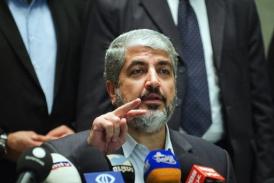DAMASCUS: Syrian troops killed at least 22 people in an assault on the flashpoint central city of Hama that prompted US calls for an immediate pullback, human rights activists said on Wednesday.
Troops also wounded more than 80 people as they pushed through improvised roadblocks put up residents after massive anti-government protests in the city of some 800,000 people, the National Organization for Human Rights said.
"The wounded are being treated in two hospitals in Hama," the rights group’s chairman Ammar Qurabi told AFP in Nicosia, adding that troops had entered the Al-Hurani hospital.
"A large number of Hama residents have fled either to the nearby town of Al-Salamiya or towards Damascus," Qurabi said.
London-based watchdog Amnesty International accused the authorities of committing crimes against humanity in its deadly crackdown on the unprecedented anti-government protests that have swept the country since mid-March.
The Syrian Observatory for Human Rights said that the body of one of those killed in Tuesday’s assault had been dumped in the Orontes (Assi) river in Hama, which is famous for its ancient watermills.
A 12-year-old boy was among three people killed by security forces on the outskirts of the city on Monday, activists contacted by telephone from Nicosia told AFP.
"Residents have mobilized. They’re prepared to die to defend the city if need be rather than allow the army to enter," said Rami Abdel Rahman, head of the London-based Syrian Observatory.
"Residents have been sleeping on the streets and put up sand barriers and tires to block any assault," he told AFP on Tuesday.
Another activist insisted that Hama, where as many as 500,000 people took to the streets for a demonstration on Friday against President Bashar Al-Assad’s regime, was putting up a "100 percent peaceful" resistance.
The US State Department urged the Syrian government to withdraw its troops from Hama and other cities, saying it too had no evidence that the protests had been anything other than peaceful.
"We urge the government of Syria to immediately halt its intimidation and arrest campaign, to pull its security forces back from Hama and other cities, and to allow Syrians to express their opinions freely so that a genuine transition to democracy can take place," spokesperson Victoria Nuland said.
She added Washington was "very concerned about the ongoing attacks against peaceful demonstrators in Syria."
"The government of Syria claims that it’s interested in dialogue at the same time that it is attacking and massing forces in Hama, where demonstrations have been nothing but peaceful."
Since security forces gunned down 48 protesters in the city on June 3, Hama has escaped the clutches of the regime, activists say. The next day, more than 100,000 mourners were reported to have taken part in their funerals.
Hama was the scene of a 1982 bloodbath in which an estimated 20,000 people were killed when the army crushed an Islamist revolt against the rule of the president’s predecessor and late father, Hafez Al-Assad.
On a visit to Saudi Arabia on Tuesday, British Foreign Secretary William Hague called on the Syrian president to make good on his repeated promises of reform.
"I made clear my view that President Assad’s proposals for reform need to be implemented quickly and fully if they are to be of any significance,"
Hague said after talks in the Red Sea city of Jeddah with his Saudi counterpart Prince Saud Al-Faisal.
He stressed "the importance of the Syrian government taking rapid and concrete action to stop the violence and change the situation."
In a report released on Wednesday, Amnesty made allegations of torture, deaths in custody, and arbitrary detention during an assault by Syrian troops that lasted several days in May on Tall Kalakh, a protest centre near the Lebanese border.
"Amnesty International considers that crimes committed in Tall Kalakh amount to crimes against humanity," the watchdog, said calling on the UN Security Council to refer the allegations to prosecutors of the International Criminal Court.
"The accounts we have heard from witnesses to events in Tall Kalakh paint a deeply disturbing picture of systematic, targeted abuses to crush dissent," said Amnesty’s Middle East and North Africa deputy director, Philip Luther.
Human rights groups say that more than 1,300 civilians have been killed and thousands more arrested since the protests started nearly four month ago.
